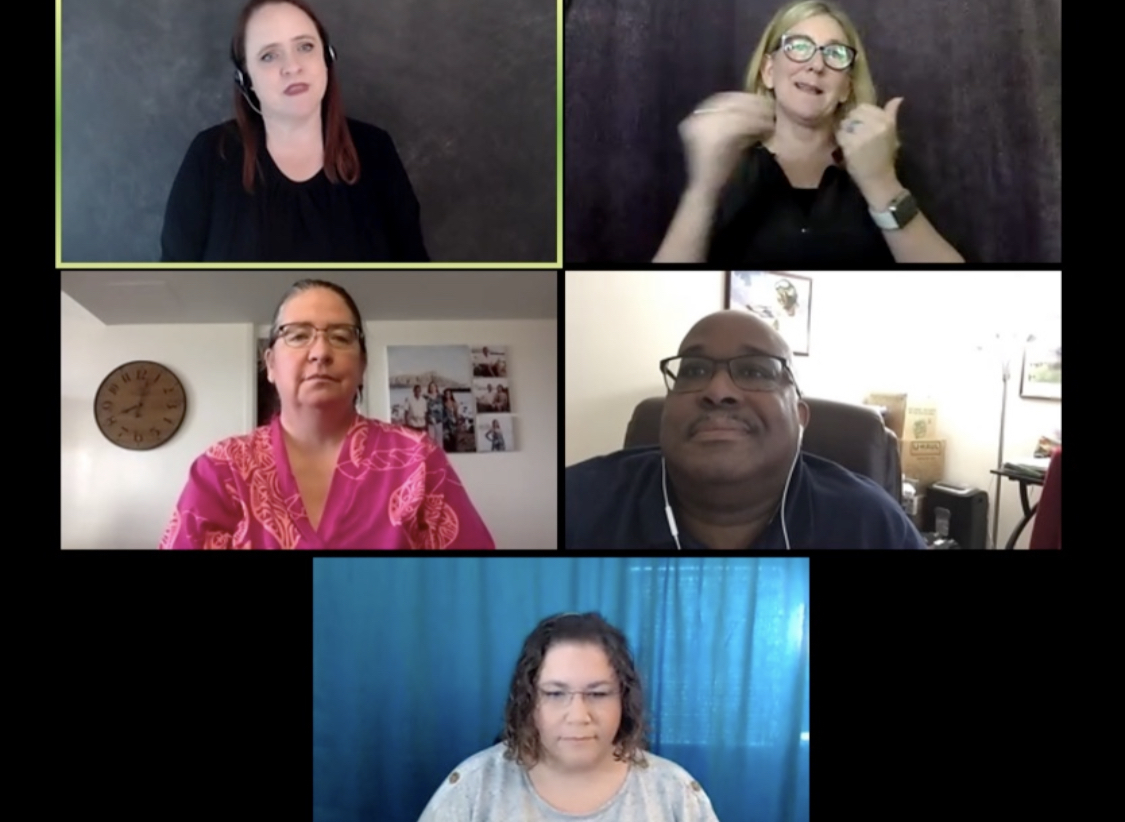For deaf students attending high school and preparing to enter college or careers, COVID-19 is adding uncertainty to a time that, while exciting, is already challenging.
And their parents, caregivers, and other family members may also be struggling to navigate the pandemic while also supporting a deaf child’s education and transition to life after high school — support that research shows is critical to academic, career, and personal success.
That’s why the National Deaf Center on Postsecondary Outcomes (NDC) hosted two live online panels for families of deaf youth nationwide, to help them connect and learn from each other. Held on September 20 and 29, these two live events provided valuable insights and resources for navigating accommodations in shifting learning environments and revealed how families are engaging and encouraging their children’s progress during the pandemic.
Family Panelists Shared Their Experiences
Attendees got the chance to tap into a wealth of child-raising and professional experience from the panelists and each other. The panelists, who have navigated educational systems from multiple vantage points, included:
-
Darlene Ewan: A teacher and community advocate, Ewan is the mother of two deaf children, ages 14 and 13, who attend Hawaii School for the Deaf and Blind.
-
Jim Kennedy: A Virginia-based writer and speaker on parenting and parent leadership, Kennedy is the father of three children. His oldest daughter is deafdisabled and now enrolled in college.
-
Sarah Milem: The mother of a 14-year-old deaf son who’s in the 10th grade at a public charter school, Milem serves as an educational advocacy coordinator for Texas Hands and Voices.
Poll Results Show Concerns about Health, Communications, and Resources
During the online panels, attendees were polled on several topics of interest to caregivers during the pandemic. (They could provide more than one response.)
Their greatest concerns with schools reopening this fall:
-
Health and safety of attending in-person classes (55%)
-
Balancing multiple schedules (45%)
-
Providing academic support (25%)
-
Home-school communications (10%)
-
All of the above (25%)
The areas their children most needed to support self-advocacy skill development:
-
Communication skills and ability to articulate needs (67.5%)
-
Ability to make informed decisions (32.5%)
-
Knowledge of rights (25%)
Do they have the information and resources available to support their education and employment interests?
-
Yes: 29%
-
No: 12.5%
-
Somewhat: 58.5%
The Shift to Online Learning
The panels began with the question from moderator Lore Kinast, Technical Assistance Specialist at NDC and a parent of a deaf child herself, about how families have encouraged their children to make sure they’re successful as they transition into a new school year.
Ewan’s focus is on COVID-19’s impact on academic regression and changes in curriculum.
“I really wanted to avoid any type of regression in their IEPs,” said Ewan. “If they’re assessing at a ninth grade level, I don’t want them to move down to a seventh grade level. So the assessment of where they were and what was considered regression was a big concern for me during COVID-19, plus the change in curriculum. I know teachers were trying to make those adjustments to make everything work online and to navigate all of this during the pandemic. It has been a challenge and we’ve seen that happen a lot.”.
Customizing Accommodations is Critical
“We’ve had to have some really direct conversations about what has worked in the past, versus what is gonna work now, and help Preston pinpoint when he knows something’s not working. You know, at one point he wanted all interpreting for [online classes]. And now he’s going, well, I like having an interpreter in this area, but I think I really need CART over here,” said Milem.
The rapid shift to online classes and the necessary online accommodations was difficult last spring, especially for Kennedy’s daughter in a mainstream environment at Hampton College.
“It was very, very difficult. Julia had an interpreter that was there on campus, but she did not have an interpreter [online]. So we had to rely on the video phone and things like that, because she was the only deaf person that was on campus. Communicating with hearing friends and the people she needed to in groups and clubs was a big challenge. All of those things really combined to add a lot of stress to her college experience,” said Kennedy, adding that for this fall semester, his daughter decided to transfer to Gallaudet University as a visiting student, to ease accommodations during the pandemic.
Kennedy added, “Not only did she advocate for herself; we helped her in advocating, because we said, okay, these are the things you need to know about ADA. You’re no longer in IDEA, you’re no longer covered by that. You have to understand ADA to make sure that you have all of the accommodations that you’re entitled to. But in addition to being deaf, Julia also has cerebral palsy. So we talk about the deaf challenges as well as the physical challenges.”
Examples of Self-Advocacy
“We got very lucky, because a part of his high school IEP goals, some of his goals included learning about 504 and those college rights and all of that,” said Milem. “So I think that made it all a lot easier for him. We’ve really encouraged him, from the time he was very little, to handle this all on his own. And he really stepped up, in a big way!”
Outside of class, Milem’s son also advocates for his rights. At a movie theater that wouldn’t lend captioning devices to people without a driver’s license or a parent, he asked to speak to the manager.
“Preston proceeds to explain to the manager that, if my mom dropped me off here to see a movie with my friends, I should be able to get captions without having to have an adult come with me. If my friends can come to a movie without an adult, so can I. And he actually got the policy changed at that theater!” said Milem. “It was eye-opening to me. It made me realize he really did understand what his rights were and was able to use them in action. As far as school goes, he goes to a public charter school, where he was the first deaf or hard of hearing [student] and we had to do a lot of education. Preston has stood up for himself in a number of ways. He has spoken to the school board; he has written letters; he has done all sorts of things.”
As the only deaf person in her dorm, Kennedy’s daughter has advocated for herself, such as when meetings did not have interpreters and safety measures lacked access for her.
Ewan’s sons advocated for interpreters for some classes at the public school at the ages of 11 and 10.
“They did some research, and learned ways to get an interpreter. And it did get better! Sure enough, year after year, the kids know what to do to advocate for themselves. Encouraging them to take that initiative is critical,” said Ewan.
The Role of Vocational Rehabilitation (VR)
An audience member asked the panelists if they connect to vocational rehabilitation services and if it has been helpful.
“When we first moved to Virginia, we contacted DARS, which is the Department of Aging and Rehabilitation Services. It was almost a year before we were able to get them fully engaged. But once we got them engaged, it’s been wonderful,” said Kennedy. “You really have to understand the rules of that particular state, because every state is different. They worked with Julia to understand all the benefits that she was entitled to, especially now that she was over 18. The other thing that really helped is her counselor for DARS is deaf and went to a mainstream school, so he knew exactly what she was facing.”
Power of High Expectations
“Our primary rule of thumb is that communication is not an excuse. It’s something we have to address and fix, but it’s not an excuse for not doing or accomplishing something,” said Milem. “I think sometimes the lack of high expectations isn’t so much from parents, as the message they get from other people around them. [My son] wants to be a lawyer. When someone says, oh, can you…do that? We immediately respond with of course you can! They don’t know what they’re talking about!”
Ewan has encouraged her oldest son to start thinking about transitioning to employment and adulthood, but the pandemic is setting up roadblocks.
“My son just turned 14 in June. With COVID, there are already a lot of barriers that are happening, with access to information, inability to make appointments, and things like that. So we sat down and I said, you know, now that you’re 14, you’re transitioning to be outside of high school. We need to start working on your plan,” said Ewan. “And he said, oh, so I need to go get a job right now? I said, no, we’re just going to explore job opportunities. What is it that you like to do? We talked about where he needs support, in terms of interpreting, and what he’s going to need for future jobs. We connected those dots, which is really great. But COVID has created many barriers, for many of us, and that’s been our struggle. I know it’ll get better, but sometimes it’s a little frustrating. You know, being 14 is tough, especially right now.”
In Kennedy’s family, the motto is “find another way” — if you can’t reach a goal one way, find another way to accomplish it. That helped when IEP planning hit a snag: Julia wanted to be a lawyer, but the advisor at school noted “paralegal” in her IEP plan.
“She came home and was very, very frustrated. This was not her plan, and it’s not okay making things ‘easier’ for her. I told her to go back there and fight for herself, and that’s exactly what she did,” said Kennedy. “When we talk about expectations, we’ve always had high expectations for our daughter. The other thing that we did was we made sure that we introduced her to mentors who were where she wanted to be, such as a deaf attorney and deaf filmmakers, to see what was possible.”
Supporting Kids — And Also Supporting Fellow Parents
Milem relied upon the Minnesota Compensatory Skills Checklist as a resource to gauge progress from kindergarten through 12th grade and build skills. She also cites the Department of Justice Effective Communication FAQs as essential.
“I feel like every parent of a deaf child should read it, love it, learn it. I think it gives us so much strength in supporting our kids, and knowing that the things that they need are not just optional; there are things that we really can fight for, and we can encourage them to fight for,” said Milem.
Ewan agreed, stressing that it’s important to also be a role model for other parents.
“My parents are deaf, and my father always told us to be an example. I didn’t understand that until I got a bit older and I realized I had to be an example for other parents who may not know how to fight for their deaf children,” said Ewan. “Really just encourage them that we can do this, and we can do it together. As the number of parents grows, then that makes it better for everyone else. You know, many hearing parents feel like they’re at a loss. They aren’t sure. Although definitely not the two parents that are on this panel! But parents like Sarah and Jim can be an example to those who just feel like they can’t do anything, or they don’t know what they can do. So, on behalf of the deaf community, myself included, I want to thank parents like you for being an example. And I think if hearing parents follow your lead, we will see a huge change.”
Part of a Series
These panels are part of a series of online events hosted by NDC to address the needs of deaf young adults at school and work during the COVID-19 pandemic.
Past events included two panels for deaf college students to connect and find ways to cope with unique struggles, a session for state leaders in education and VR to strategize transition planning and services, as well as panels that brought together people who are #DeafAtWork, disability services professionals, and VR counselors and agencies.
More Resources From NDC
The information provided during the panels go hand-in-hand with NDC’s Deaf Success in Fall 2020: Guide for Families, Parents, and Students, a collection of strategies, resources, and expert tips available in English, ASL, and Spanish, and COVID-19 Information Hub.
Hundreds of other free resources are available, including Deafverse, a choose-your-own adventure online game for deaf teens to learn important skills in high school and beyond. NDC offers free online classes on Deaf 101, Instructional Strategies, Effective Communication and much more. Sign up for NDC’s newsletter and listserv to stay updated on new events, resources, and classes.
Contact NDC | Help for additional questions or make an appointment with one of our specialists.









